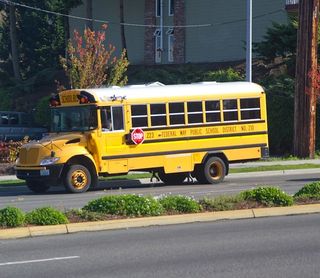Education
Choose Local. Choose Public.
Eleven reasons your local publicly funded school is probably the best option.
Posted September 21, 2019

Every situation is different, but for most children and most families, the best place to start is your local publicly funded school.
According to some experts, wealthy parents are increasingly choosing to send their children to public schools. There are lots of good reasons to do that, whether you can afford to go private or not. Here are some reasons to start your child at the local public school:
- Short and easy commute. That sounds like a benefit for parents (which it is) but being able to get to school in a short time has even more benefits for your child. They’ll have more of the day for play and reading and other good things; they’ll be less stressed by commuting worries; they’ll feel more independent, because they know how to get home on their own if they need to do that; and they’ll be healthier, because taking a walk in the neighborhood is a great way to start and finish the school day.
- Community engagement. The people your child meets at the local public school (kids, parents, teachers) are the same ones they meet at the grocery store, in the park, and walking down the street. This builds a sense of belonging, which helps your child feel secure and confident.
- Friendship-building. Arranging playdates is a lot more convenient when they’re closer to home. That means your child will have more time to play with the kids at school, enriching their friendships, and adding to a sense of belonging and security.
- Financial savings. There are almost always better ways to spend your money than on school fees, ways that provide your child with more quality-of-life enrichments than a private school. By choosing a public school, you will have less financial stress (which is good for your child), and you will have more opportunities for travel, adventure, and cultural activities.
- More diversity. Publicly-funded schools are almost always more diverse and inclusive, pulling together kids from a wider range of backgrounds and interests, kids with a wider range of abilities and disabilities. This opens your child’s mind to a wider range of experiences and possibilities, and has many important long-term benefits: better critical thinking, problem-solving, and creativity, as well as reduced anxiety, increased confidence, and increased comfort in diverse settings.
- Less entitlement and elitism. Private school students are more likely to come from wealthier, more privileged, backgrounds. That can mean more entitled parents and kids, and an elitist and exclusive attitude.
- Qualified teachers. Public schools hire only certified teachers, whereas private schools aren’t restricted in their hiring. Some private schools attract some great teachers, but private school staffs tend to be more mixed in both credentials and competence levels. People who go into teaching as a chance to make the world a better place are more likely to choose to work in the public system. Also, public schools pay considerably more and provide better benefits than most private schools, which helps attract better teachers.
- A good education. International studies show that public schools do at least as good a job of educating children as private schools. Any advantage private schools might have in rankings based on test scores or university entrance rates is a function of demographics rather than the schooling itself. Kids from more privileged backgrounds tend to have more educational support at home, and to have better educational outcomes, whether they attend private or public schools.
- A better education for smart, curious, idiosyncratic kids. Over decades of working with exceptionally capable learners in a wide variety of school settings, I’ve learned that the more exceptional the child, the more likely it is that public schooling will offer the range of learning experiences the child needs, adapting more flexibly to the child’s abilities and interests. Public school teachers have better training and support for adapting to exceptional learning needs. That doesn’t mean it always goes well for gifted and creative kids in public schools—it doesn’t—but it is easier to get your concerns heard and responded to, and you usually have school policy on your side. Private schools, with some notable exceptions, are most likely to tell you they’re already providing a challenging education, and that your child is no different than their other students.
- Comparative advantage. Some kids thrive in educational settings where all the other students are highly motivated and high-achieving. But others do best in a more mixed and less competitive environment where they can stand out. It may seem counter-intuitive, but many highly competent kids feel more confident in their abilities in a school that’s less elite.
- A stronger society. Society thrives when parents who care about education send their kids to public schools, thereby supporting those schools in providing a high quality of education. The converse is also true: the social fabric deteriorates when the most highly motivated parents pull their kids out of the public system. You want to strengthen the social fabric your child will inherit, not weaken it.
There are some wonderful private or independent schools, and there are some troubling public education situations, so public schools are not always the best option. There are kids whose learning needs are best met (in the short term or the long term) by private schools or homeschooling, but my advice to parents is to start with the local public school, and see if you can make that work for your child. If your child doesn’t thrive there—and can’t be helped to do so with your intervention or supplementation—only then is it time to investigate other options.
Note: I am writing this in Toronto. Ontario has one of the best public education systems anywhere, and Canadians, in general, see the importance of good publicly funded education, so this position is easier to take here than in some other places. However, research shows that these ideas also apply pretty well everywhere else, at least in the developed world.
References
“Private Schools: Who Benefits?” PISA In Focus, Organization for Economic Co-operation and Development


